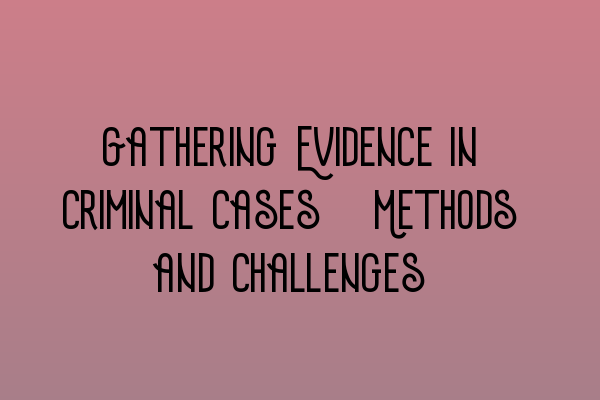Gathering Evidence in Criminal Cases: Methods and Challenges
Welcome to SQE Criminal Law & Practice Law UK! In this blog post, we will explore the various methods of gathering evidence in criminal cases and the challenges that may arise during the process. If you are interested in preparing for the SQE exams, check out our SQE 1 Practice Exam Questions and SQE 1 Practice Mocks FLK1 FLK2 articles. For SQE 2 preparation, we offer SQE 2 Preparation Courses, and for SQE 1, we have comprehensive SQE 1 Preparation Courses. If you want to know more about the SRA SQE Exam Dates, click here: SRA SQE Exam Dates.
Methods of Gathering Evidence
In criminal cases, gathering evidence is a crucial step that helps establish the guilt or innocence of the accused. Several methods are employed in this process:
- Witness Statements
- Physical Evidence
- Forensic Analysis
- Surveillance
- Electronic Data
- Expert Testimony
Witness statements play a vital role in gathering evidence. They provide firsthand accounts of the events in question and can significantly influence the outcome of the case. Physical evidence, such as fingerprints, DNA samples, or weapon recovery, can provide concrete proof of a crime and link the suspect to the scene.
Forensic analysis plays a crucial role in criminal investigations. It involves the examination of physical evidence, such as bloodstains, fibers, or tire tracks, to establish facts and draw conclusions. This scientific approach helps to unravel mysteries and provide solid evidence in court.
Surveillance is another method used to gather evidence in criminal cases. It involves monitoring the activities of suspects to gather incriminating information or establish their whereabouts during the time of the crime.
Electronic data has become increasingly important in criminal investigations. With the rise of technology, digital evidence, such as emails, text messages, or social media posts, can provide valuable insights into a suspect’s activities and intentions.
Expert testimony is often relied upon to explain complex scientific or technical aspects of a case. Experts in various fields, such as forensics, medicine, or psychology, can provide insights that help the court understand and evaluate the evidence.
Challenges in Gathering Evidence
While the methods of gathering evidence are essential, there are also numerous challenges that can complicate the process:
- Missing or Incomplete Evidence
- Uncooperative Witnesses
- Conflicting Witness Testimony
- Legal Constraints
- Technological Limitations
- Chain of Custody
Missing or incomplete evidence can hinder the investigation and limit the strength of the prosecution’s case. It may result from factors such as tampering, loss, or oversight during the gathering or preservation process.
Uncooperative witnesses can pose a significant challenge. Some witnesses may be reluctant to come forward due to fear, intimidation, or personal motives. Their cooperation is crucial in ensuring a fair trial and gathering accurate and reliable evidence.
Conflicting witness testimony can create difficulties in establishing the truth. Different witnesses may have different perceptions or recall events differently, leading to inconsistencies that must be carefully evaluated and resolved.
Legal constraints can also impact the gathering of evidence. There are rules and procedures that must be followed to ensure the admissibility of evidence in court. Failure to comply with these rules can render evidence inadmissible and weaken the prosecution’s case.
Technological limitations can hinder the collection and analysis of electronic data. Encryption, data corruption, or the use of sophisticated tools by criminals can make it challenging to access and interpret digital evidence.
The chain of custody is crucial in maintaining the integrity and reliability of evidence. It refers to the documentation and tracking of evidence from its collection to its presentation in court. Any break in the chain of custody can raise doubts about the authenticity and admissibility of the evidence.
In conclusion, gathering evidence in criminal cases is a complex process that requires a combination of various methods and techniques. Despite the challenges that may arise, diligent and professional handling of evidence is essential for a fair trial and the pursuit of justice.
